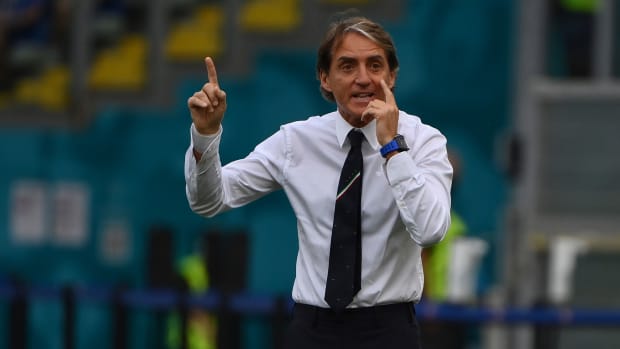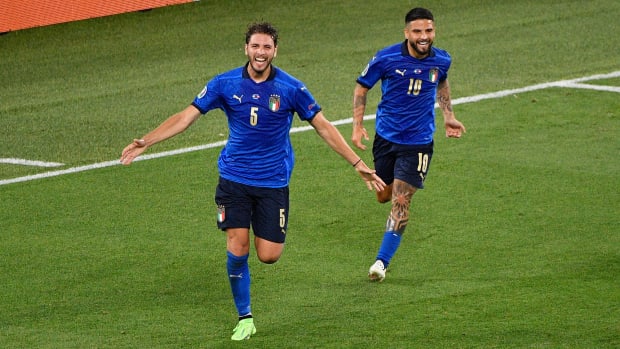After failing to qualify for the 2018 World Cup, Italy has come back with a vengeance and looks like one of the top candidates to win the European Championship.
International football is supposed to be stodgy. Managers have limited time to work with players, and as a result the international game has moved in a different direction to that of the club game. Where the latter stages of the Champions League tend to be about pressing and cohesive attacking structures, international football is more typically about solid defensive structure enlivened by the occasional flash of individual flair.
And then you see Italy.
At least from a European perspective, Euro 2016 was perhaps the nadir of the stodginess. Far more sides attempted something more proactive in the World Cup in Russia two years later. Other than last Friday, when all three games were uninspired trudges, Euro 2020 has followed that trend. The football has generally been fairly open—in Germany’s case, spectacularly so. There have been sporadic attempts by various teams to press. But only one has done so consistently and effectively: Italy is playing like a top club side, and its reward has been three wins from three games, with seven goals scored and none conceded.
There had been signs that, after the humiliation of failing to qualify for the 2018 World Cup—the first time Italy had failed to get there since 1958—things were improving under manager Roberto Mancini. Since leaving Manchester City in 2013, Mancini’s career had gone into something of a slump. He won a Turkish Cup in 2014, but other than that, stints at Galatasaray, Inter Milan and Zenit St. Petersburg were unremarkable. But he is one of the very few international managers with a recent history of success at a major club. Only Spain's Luis Enrique has had anything like his record in elite club management.

And it shows. Mancini, who is already signed through the 2026 World Cup, is still only 56. He remains energetic and has a willingness to make major changes that is not common in the international game. Slowly, reluctantly, Italy has accepted a pressing game, a process that has taken more than 30 years. What Arrigo Sacchi began at AC Milan has finally been adopted en masse. Inter and Atalanta are part of the new wave. The national team pressed under Antonio Conte, but it is only over the past couple of years that it has begun to excel with the approach.
For the first time in its history, Italy qualified for the Euros with a perfect record (10 wins out of 10). It is now unbeaten in 30 games since a UEFA Nations League defeat to the eventual winner and defending European champion Portugal in September 2018. Italy had never previously scored more than two goals in a game at the Euros, yet both of the first two games in this competition were won 3-0, with wave after wave of attack even after the game was secure. Italy has not conceded a goal in 11 matches stretching back to November of last year, a counterintuitive statistic that emphasizes the point Sacchi made repeatedly: pressing, defending high up the pitch and playing proactively does not necessarily weaken the defense.
Every question that has been posed so far at the Euros has been answered. Are central defenders Leonardo Bonucci and Giorgio Chiellini quick enough to play in this system? They have been so far, although Chiellini was forced off during the win over Switzerland with a hamstring problem; his replacement, Inter's 22-year-old Alessandro Bastoni looks up for the challenge if needed further. Could Leonardo Spinazzola, a relatively unheralded wingback, cope? He has been the best fullback in the tournament so far, offering attacking thrust on the left despite being right-footed.

How would the midfield look without the injured Marco Verratti? Manuel Locatelli has excelled, scoring twice against the Swiss. With Verratti coming unscathed through the final group game against Wales, Mancini now has a difficult choice. Either way, the midfield balance with Jorginho's passing metronomically in front of the back three and Nicolò Barella's creating looks good.
There were few doubts about Lorenzo Insigne and Domenico Berardi from wide, especially with Federico Chiesa in reserve, but would Ciro Immobile, whose prolific club form had never translated to the international stage, score enough goals? He has scored in his last four games for Italy, including the matches in this tournament against Turkey and Switzerland, before being rested against Wales.
The are two caveats. One is that, save for a scoreless draw in the return match vs. Portugal to conclude its group play in the Nations League in 2018, in this 30-match unbeaten run Italy has not played a truly top-class side: no France, Germany, Belgium, Spain or England, let alone a big South American team. (It did beat and draw the Netherlands in the subsequent Nations League campaign to top its group and set up an October 2021 semifinal vs. Spain.) The other is that as impressive as Italy has looked, the entirety of its group stage took place in Rome. The remainder of its potential path at the Euros goes through London and Munich. There is another level still for the Azzurri to reach. But at this stage, Italy has emerged as what is perhaps the most likely team to challenge reigning World Cup champion France for the title.
More Euro 2020 Coverage: